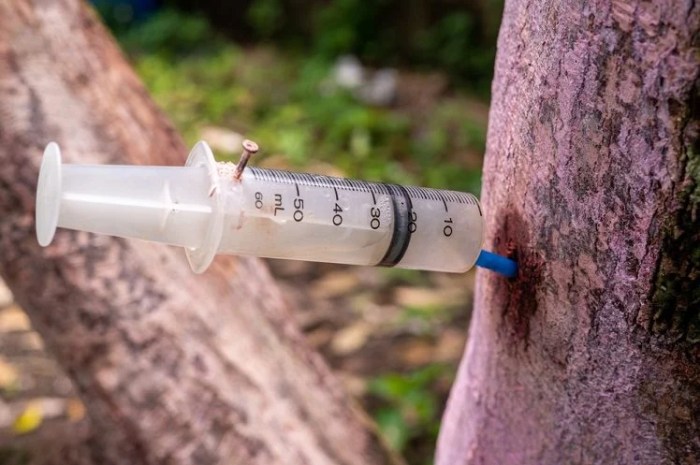Is Distilled Water Good for Plants?
Distilled Water for Plants: A Comprehensive Overview: Is Distilled Water Good For Plants
Is distilled water good for plants – Distilled water, purified through boiling and condensation, is often considered a pure form of H₂O, devoid of minerals and impurities found in tap or rainwater. However, its suitability for watering plants is a subject of ongoing debate among gardeners. This article explores the composition, effects, and alternatives to distilled water for plant hydration, providing a balanced perspective on its use.
Distilled Water Composition and Properties
Distillation involves heating water to create steam, which is then collected and condensed back into liquid form. This process effectively removes dissolved minerals, salts, and other impurities present in the original water source. The resulting distilled water is chemically pure H₂O, unlike tap water, which contains varying levels of minerals, chlorine, and other substances depending on the source and treatment processes.
Rainwater, while naturally occurring, can also contain dissolved minerals, pollutants, and even acidic components depending on atmospheric conditions.
The pH of distilled water is typically neutral (around 7.0), while tap water pH can vary significantly depending on location and treatment, often ranging from slightly acidic to slightly alkaline. Rainwater, particularly in areas with industrial pollution, can be significantly more acidic.
| Mineral | Distilled Water | Tap Water | Rainwater |
|---|---|---|---|
| Calcium (Ca) | Trace amounts | Variable, often high | Variable, low to moderate |
| Magnesium (Mg) | Trace amounts | Variable, often high | Variable, low to moderate |
| Potassium (K) | Trace amounts | Variable | Variable |
| Sodium (Na) | Trace amounts | Variable | Variable |
Effects of Distilled Water on Plant Growth
Essential minerals like calcium, magnesium, potassium, and nitrogen are crucial for plant growth and development. They play vital roles in various physiological processes, including photosynthesis, nutrient uptake, enzyme activation, and structural integrity. Mineral deficiencies can lead to stunted growth, chlorosis (yellowing of leaves), reduced yield, and increased susceptibility to diseases. Plants watered solely with distilled water may experience nutrient deficiencies, as this water lacks the essential minerals readily available in tap or rainwater.
Some plant species may exhibit greater tolerance to distilled water than others. For example, hydroponic systems often use nutrient solutions instead of water, and distilled water is frequently the base. However, even in these controlled environments, the addition of mineral supplements is crucial. Plants grown in soil are generally more negatively impacted by distilled water, as soil naturally provides a source of essential minerals.
Long-Term Effects of Using Distilled Water

Source: thankyourgarden.com
While distilled water lacks essential minerals, its purity can be beneficial for certain plants, especially those sensitive to mineral buildup. Understanding why plants need water for growth is crucial; to learn more, check out this article on why do plants water to grow. Ultimately, the suitability of distilled water depends on the plant’s specific needs and the overall growing environment.
The prolonged use of distilled water can negatively impact soil health. The continuous leaching of minerals from the soil can alter its structure, making it less fertile and more prone to erosion. The lack of minerals can also disrupt the soil’s microbial communities, which play essential roles in nutrient cycling and disease suppression. Furthermore, the continuous use of distilled water can lead to soil acidification over time, potentially further hindering plant growth and health.
A controlled experiment could compare the growth of the same plant species (e.g., tomatoes) in three groups: one watered with distilled water, one with tap water, and one with rainwater. Growth parameters (height, leaf area, fruit production) could be measured over a period of several months to determine the impact of each water source on plant health.
Alternatives to Distilled Water for Plants, Is distilled water good for plants

Source: thespruce.com
Rainwater and filtered tap water offer viable alternatives to distilled water for plant irrigation. Rainwater naturally contains some dissolved minerals and is generally a good source of nutrients, although its composition can vary depending on atmospheric conditions. Filtered tap water removes many impurities, but it still retains some essential minerals. The choice between these options depends on the specific needs of the plants and the quality of the available water sources.
- Rainwater: Generally a good option, but can be acidic or contaminated depending on location.
- Filtered tap water: Removes many impurities while retaining some minerals. Consider a filter that doesn’t remove all minerals.
The ideal pH range for various plants can vary significantly. For instance, acid-loving plants like blueberries thrive in a more acidic range (pH 4.5-5.5), while many other plants prefer a slightly acidic to neutral pH (6.0-7.0).
- Acid-loving plants (e.g., blueberries, azaleas): pH 4.5-5.5
- Most other plants: pH 6.0-7.0
- Alkaline-tolerant plants (e.g., some succulents): pH 7.0-8.0
| Water Source | Cost | Mineral Content | Ease of Access |
|---|---|---|---|
| Distilled Water | Moderate | Low | Readily available |
| Tap Water | Low | Variable, often high | Readily available |
| Rainwater | Low | Variable, low to moderate | Dependent on rainfall |
| Filtered Water | Moderate to High | Variable, depends on filter | Readily available |
Visual Representations of Plant Health
A healthy plant exhibits vibrant green leaves, strong stems, and vigorous growth. Conversely, a plant suffering from mineral deficiencies may show signs of chlorosis (yellowing of leaves), stunted growth, wilting, and reduced overall vigor. Leaf margins may become brown or scorched. The severity of these symptoms depends on the specific nutrient deficiency and the plant species.
A plant suffering from nutrient deficiency due to distilled water might show uniformly pale green or yellow leaves, especially in younger growth. The leaves might be smaller than normal, and the overall plant might be significantly stunted. Severe cases could result in leaf drop, wilting, and eventually plant death. The symptoms might not appear immediately but would become progressively more pronounced over time.
FAQ Insights
Can I use distilled water for all my plants?
No, using distilled water exclusively is generally not recommended for most plants. Long-term use can lead to nutrient deficiencies.
What are the signs of mineral deficiency in plants?
Signs include yellowing leaves (chlorosis), stunted growth, wilting, and overall reduced vigor. Specific symptoms vary depending on the deficient nutrient.
Is rainwater a good alternative to distilled water?
Yes, rainwater is often a good alternative as it naturally contains minerals beneficial to plants. However, avoid rainwater collected in areas with high pollution.
How often should I check my soil’s pH?
Regular soil pH testing, ideally once or twice a year, is recommended to ensure optimal conditions for plant growth.




















